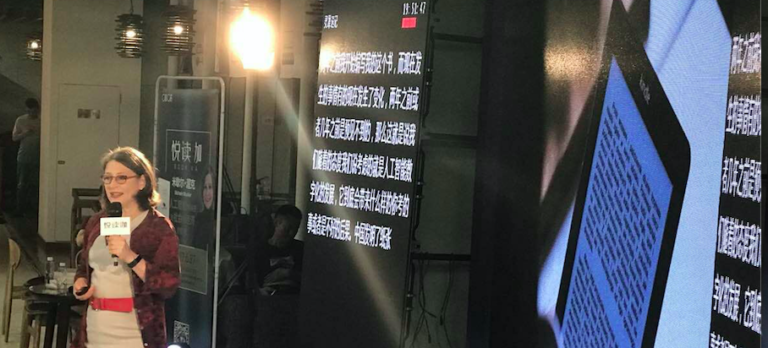How intrigued I was recently when I found that I would be speaking in Shanghai to an audience with an artificial intelligence translator.[bctt tweet=”I was intrigued to speak in Shanghai to an audience with an artificial intelligence translator. ” username=”@wucker”]The team fed a draft of my remarks to it ahead of time to “train” it. As I spoke, it interpreted my remarks and posted them on large screens behind me.
Like many new forms of AI, there’s still human involvement: a real person supervised the translation program. That may have been why there was a long delay. A really, really long delay, which made for a challenging experience in the interactive portions of my presentation. I waited, and waited, and waited, for the audience to respond. Finally, I concluded that this was just a really tough crowd. It wasn’t until after I finished speaking that I learned that the translator was at least three full sentences behind me.
I had no way to judge how accurate the translation was. You may have seen some of the “Google Translate Songs” sketches during which Jimmy Fallon and celebrities sing karaoke using popular songs translated into other languages, then back, with hilarious and sometimes surprisingly catchy results. If not, it’s worth watching. (A close friend calls Google Translate “Google Mangle.” To be sure, it’s a learning process.)
This was the organizers’ first foray into AI translation, as it was mine. There’s clearly a learning curve for speakers and AI translators to work together. But it was very exciting to be an early adopter, just as it was obvious that AI translation will be a bigger part of our future. [bctt tweet=”It was exciting to be an early adopter speaking live using an AI translator.” username=”@wucker”]
It probably was unfair to the AI translator to have to follow a truly talented and remarkable human interpreter the night before, who was so good that even though I couldn’t understand the words, her mimicking of my gestures and inflection made clear exactly when she was conveying which parts of what I had said.
In May, I spoke near Beijing at the MTA Festival using traditional simultaneous translation. That remains by far the least intrusive and closest experience for the speaker and audience.
Even in Shanghai at the event with the AI translation, I was surprised to arrive at the event venue and be introduced to a young man I was told would be the translator. “Wow, that’s some extremely realistic AI,” I thought in jest, wondering if they had ditched the machine after all. It turned out they still needed a human for the question and answer session after my remarks.
There’s a long way to go before AI translators replace humans. Still, I remain fascinated by the potential of AI translation. Just as the cell phone evolved from those giant handsets in the late 1980s to the sleek supercomputers they are now, all new technologies are awkward at the beginning.
Yet I wonder what the impact will be on jobs once AI translators mature in the future. [bctt tweet=”What will the impact will be on jobs once AI translators mature in the future?” username=”@wucker”]Artificial intelligence and automation have already transformed and eliminated many jobs, and this is just the beginning. Studies have suggested that developed economies may lose as many as 50 percent of jobs to automation. For countries like China, which have built their economies on manufacturing, the number may be as high as two-thirds of jobs. [bctt tweet=”Economies newly built on manufacturing may lose as many as two-thirds of jobs to automation and AI” username=”@wucker”]
Some human translators certainly will lose their posts for less sophisticated applications. But how many other opportunities will be created as more people are able to afford communicating with people in other languages? Jobs in programming and production of AI translation systems? AI translator “babysitters”? What will the premium be for the top human translators?
And how, given that the lion’s share of gains of technology go to those who have capital to invest, how will societies equitably address the needs of those who are left behind?
The answers are not clear or simple. But these are the kind of questions we need to ask wherever artificial intelligence has the potential to take over existing jobs. It’s one of the biggest, most obvious changes coming our way, but we are nowhere nearly prepared for the changes that have already happened, much less those to come.
- The Gray Rhino Wrangler on Substack - January 1, 2025
- Gray Rhino Risks and Responses to Watch in 2024 - January 10, 2024
- In the Media 2023 - December 31, 2023


